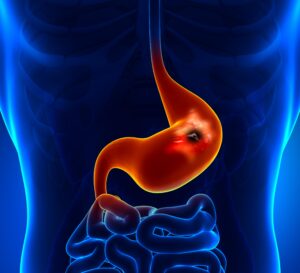Table of Contents

Peptic Ulcer Disease (PUD) is a medical condition characterized by the development of open sores or ulcers on the lining of the stomach or the upper part of the small intestine.
Have you ever had this burning sensation in your stomach, and it radiates towards your chest and your back? and it mostly occurs when you’ve not eaten? well, you’re most likely experiencing what I like to call the PUD. Well, what does PUD mean?
It’s an acronym that stands for peptic ulcer disease. Peptic ulcer disease is not your regular stomach pain, shocker, it’s worse. It’s one of those diseases which you classify as an auto-immune disease(disease condition in which the body fights against itself).
Things to know about Peptic Ulcer Disease
The first thing you should know about PUD, is that the stomach secretes gastric acid (hydrogen chloride), don’t be scared we all secrete an amount of this acid, and it helps in digestion of food and destruction of infectious microorganisms that have been ingested when eating or drinking.
There’s also a membrane layer in your Stomach called the gastric mucosal layer, this layer in combination with hydrogen bicarbonate secreted by the body, called the mucus-bicarbonate layer, protects the stomach from the gastric acid… don’t worry just keep on following.
As important as this gastric acid is in digesting food substances when there’s no food in the stomach, it tends to digest the mucosal layer because this mucosal layer is proteinous too.
Normally, this gastric acid and mucosal layer are in equilibrium, that means they are formed in an amount that compliments each other. However, in some disordered cases, the gastric acid is secreted at an amount much more than the mucosal layer formed, and this denatures the mucosal wall.
This gives rise to painful injuries in the stomach. When spicy foods are taken; the salts, pepper etc in your food or the hot tea you take, it stimulates the nerve exposed in those injuries, and causes the painful sensation that we feel… I hope you get this.
Imagine pouring salt in an opened injury, or putting pepper or hot water. it’ll be painful right? That’s the same reason you get this stomach pain when you eat that spicy food. The breakdown of the mucus-bicarbonate layer is called ulceration, while the disease condition is called a peptic ulcer.
Risk factors for Peptic Ulcer Disease
These are factors that enhance the chances for you having a peptic ulcer.
They include;
- Smoking and alcohol consumption which are the major causes of peptic ulcer disease.
- Improperly managed stress can also cause an ulcer.
- Medical conditions like gastritis, Crohn’s disease, cirrhosis of the liver, kidney failure, infection with Helicobacter pylori, etc are also risk factors.
- Some drugs are also risk factors for peptic ulcer disease. The most common class of drugs are nonsteroidal anti-inflammatory drugs such as Panadol and ibuprofen. Other drugs include oral corticosteroids, bisphosphonates, etc.
Treatment and Management of PUD
Drugs for the treatment and management of peptic ulcer disease are readily available.
So all you need to do is get to a physician, run some tests, and get your prescription. The most important way to manage the disease is by lifestyle changes i.e. certain habits should be stopped such as smoking, alcohol consumption etc. Also, keep the environment clean to prevent infection from Helicobacter pylori.
Hope you’ve learnt something?
ALSO READ:
Sickle Cell Disease: Genotype Awareness Matters More Than Love
Swap the Fizzy: 6 Healthy Drinks Recipes You Can Make at Home
HEALTHY EATING AND LIFESTYLE BENEFITS
12 Healthy Breakfast Ideas to Start Your Day Right
6 Tips For A Healthy Financial Life After College
Leave a Reply